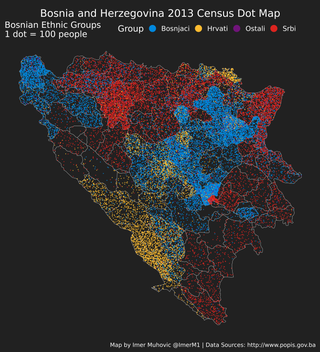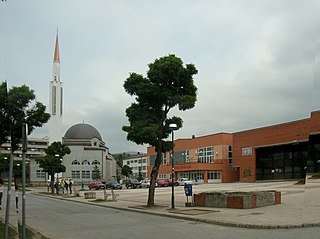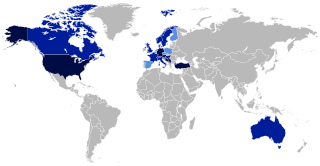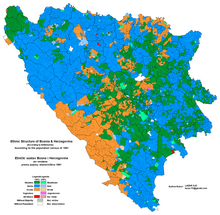
Alija Izetbegović was a Bosnian politician, Islamic philosopher and author, who in 1992 became the first president of the Presidency of the newly independent Republic of Bosnia and Herzegovina. He later served as the first chairman of the Presidency of Bosnia and Herzegovina.

The Federation of Bosnia and Herzegovina is one of the two entities composing Bosnia and Herzegovina, the other being Republika Srpska. The Federation of Bosnia and Herzegovina consists of ten autonomous cantons with their own governments and legislatures.

More than 96% of population of Bosnia and Herzegovina belongs to one of its three autochthonous constituent peoples : Bosniaks, Serbs and Croats. The term constituent refers to the fact that these three ethnic groups are explicitly mentioned in the constitution, and that none of them can be considered a minority or immigrant. The most easily recognisable feature that distinguishes the three ethnic groups is their religion, with Bosniaks predominantly Muslim, Serbs predominantly Eastern Orthodox, and Croats Catholic.

"Muslims" is a designation for the ethnoreligious group of Serbo-Croatian-speaking Muslims and people of Muslim heritage, inhabiting mostly the territory of the former Socialist Federal Republic of Yugoslavia. The term, adopted in the 1971 Constitution of Yugoslavia, groups together a number of distinct South Slavic communities of Islamic ethnocultural tradition. Prior to 1993, a vast majority of present-day Bosniaks self-identified as ethnic Muslims, along with some smaller groups of different ethnicity, such as Gorani and Torbeši. This designation did not include Yugoslav non-Slavic Muslims, such as Turks, some Romani people and majority of Albanians.

Canton 10, is one of the ten cantons of the Federation of Bosnia and Herzegovina, a political entity of Bosnia and Herzegovina. It is the largest canton by area and eighth by population. The local government seat is in Livno, while the assembly is in Tomislavgrad. It is divided into five municipalities: Bosansko Grahovo, Drvar, Glamoč, Kupres, Tomislavgrad and one city, Livno.

The Bosnian War was an international armed conflict that took place in Bosnia and Herzegovina between 1992 and 1995. The war is commonly seen as having started on 6 April 1992, following a number of earlier violent incidents. The war ended on 14 December 1995 when the Dayton accords were signed. The main belligerents were the forces of the Republic of Bosnia and Herzegovina, the Republic of Herzeg-Bosnia, and the Republika Srpska, the latter two entities being proto-states led and supplied by Croatia and Serbia, respectively.

Centar is a municipality of the city of Sarajevo, Bosnia and Herzegovina. It is located between the older parts of the city under Stari Grad, and the newer more modern parts of the city under the municipalities Novi Grad and Novo Sarajevo.

Novi Grad is a municipality of the city of Sarajevo, Bosnia and Herzegovina. It is the westernmost of the four municipalities that make up the city of Sarajevo. The municipality also consists of the villages Bojnik and Rečica.

The Sarajevo Canton, officially the Canton of Sarajevo, is one of the ten cantons of the Federation of Bosnia and Herzegovina in Bosnia and Herzegovina. Its cantonal seat is the city of Sarajevo, also the capital city of Bosnia and Herzegovina.
The population of the city of Sarajevo's four municipalities is 275,524, whereas the Sarajevo Canton population is estimated at 413,593.

Ilijaš is a town and municipality located in Sarajevo Canton of the Federation of Bosnia and Herzegovina, an entity of Bosnia and Herzegovina. It is located northwest of the inner city of Sarajevo, making it de facto a town and suburb of Sarajevo. The Ilijaš Municipality was established in May 1952 with the organization of people's committees. Those local people's committees founded the local municipalities, which led to the self-management of the municipalities, including the municipality of Ilijaš.

The Serbs of Bosnia and Herzegovina, often referred to as Bosnian Serbs or Herzegovinian Serbs, are native and one of the three constitutive nations of the country, predominantly residing in the political-territorial entity of Republika Srpska. Most declare themselves Orthodox Christians and speakers of the Serbian language.

This article is about the Demographic history of Bosnia and Herzegovina, and deals with the country's documented demographics over time. For an overview of the various ethnic groups and their historical development, see Ethnic groups in Bosnia and Herzegovina.

The Croats of Bosnia and Herzegovina, often referred to as Bosnian Croats or Herzegovinian Croats, are native and the third most populous ethnic group in Bosnia and Herzegovina, after Bosniaks and Serbs, and are one of the constitutive nations of Bosnia and Herzegovina. Croats of Bosnia and Herzegovina have made significant contributions to the culture of Bosnia and Herzegovina. Most Croats declare themselves Catholics and speakers of the Croatian language.

Bosniaks of Serbia are a recognized national minority in Serbia. According to the 2022 census, the population of ethnic Bosniaks in Serbia is 153,801, constituting 2.3% of the total population, which makes them the third largest ethnic group in the country. The vast majority of them live in the southwestern part of the country that borders Montenegro and Kosovo, called Sandžak. Their cultural center is located in Novi Pazar.
Blagovac is a settlement in Vogošća municipality, near Sarajevo, Federation of Bosnia and Herzegovina, Bosnia and Herzegovina.

The most widely professed religion in Bosnia and Herzegovina is Islam and the second biggest religion is Christianity. Nearly all the Muslims of Bosnia are followers of the Sunni denomination of Islam; the majority of Sunnis follow the Hanafi legal school of thought (fiqh) and Maturidi theological school of thought (kalām). Bosniaks are generally associated with Islam, Croats of Bosnia and Herzegovina with the Roman Catholic Church, and Bosnian Serbs with the Serbian Orthodox Church. The State Constitution of Bosnia and Herzegovina (BiH) and the entity Constitutions of the Federation of Bosnia and Herzegovina and the Republika Srpska provide for freedom of religion, and the Government generally respects this right in ethnically integrated areas or in areas where government officials are of the majority religion; the state-level Law on Religious Freedom also provides comprehensive rights to religious communities. However, local authorities sometimes restricted the right to worship of adherents of religious groups in areas where such persons are in the minority.

The Bosniaks are a South Slavic ethnic group native to the Southeast European historical region of Bosnia, which is today part of Bosnia and Herzegovina, who share a common Bosnian ancestry, culture, history and language. They primarily live in Bosnia, Serbia, Montenegro, Croatia, Kosovo as well as in Austria, Germany, Turkey and Sweden. They also constitute a significant diaspora with several communities across Europe, the Americas and Oceania.

Bosnians are people native to the country of Bosnia and Herzegovina, especially the historical region of Bosnia. As a common demonym, the term Bosnians refers to all inhabitants/citizens of the country, regardless of any ethnic, cultural or religious affiliation. It can also be used as a designation for anyone who is descended from the region of Bosnia. Also, a Bosnian can be anyone who holds citizenship of the state of Bosnia and Herzegovina and thus is largely synonymous with the all-encompassing national demonym Bosnians and Herzegovinians.

Ethnic cleansing occurred during the Bosnian War (1992–95) as large numbers of Bosnian Muslims (Bosniaks) and Bosnian Croats were forced to flee their homes or were expelled by the Army of Republika Srpska and Serb paramilitaries. Bosniaks and Bosnian Serbs had also been forced to flee or were expelled by Bosnian Croat forces, though on a restricted scale and in lesser numbers. The UN Security Council Final Report (1994) states while Bosniaks also engaged in "grave breaches of the Geneva Conventions and other violations of international humanitarian law", they "have not engaged in "systematic ethnic cleansing"". According to the report, "there is no factual basis for arguing that there is a 'moral equivalence' between the warring factions".



















